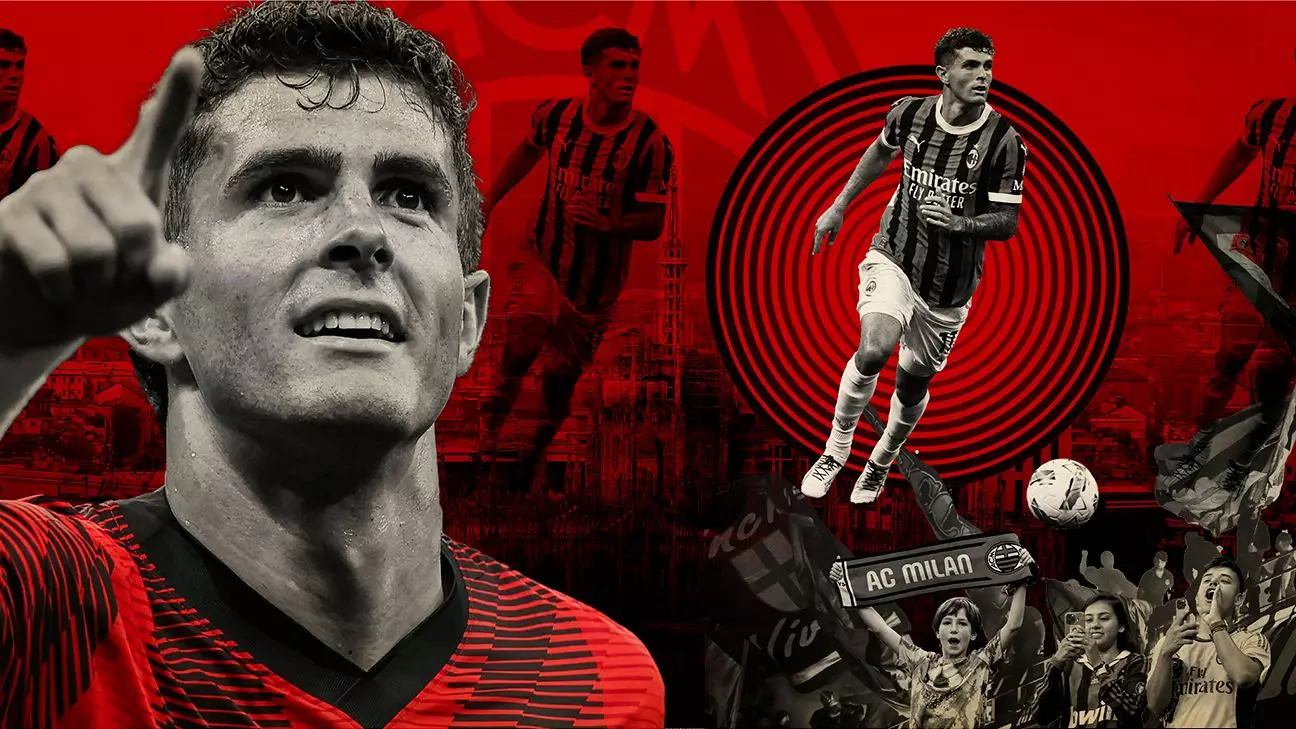Christian Pulisic’s tenure at AC Milan has been characterized by contrasts: a player whose on-field contributions have been noteworthy yet is continually challenged to adapt his role within the team’s structure. Despite leading the Rossoneri in goal contributions, the circumstances surrounding his position raise questions about how a team can underutilize its most effective players. This article delves into the complexities and frustrations embedded in Pulisic’s role at Milan, examining the implications for both the player and the club.
Emerging as a Key Contributor
After serving as a pivotal figure for the Rossoneri, Pulisic is a standout in terms of offensive output, amassing 12 goal contributions—a noteworthy feat, especially following a strong previous season where he had 20. His talent is undeniable; however, the scrutiny he faces appears disproportionate to his impact. Despite the accolades he receives from coaches and teammates alike, questioning his position within the squad persists, particularly after he was subbed off during a crucial Champions League match against Feyenoord. The timing and context of his exit from the field emphasized a troubling trend that leaves fans puzzled and critical.
One must consider why a player who contributes so significantly would find himself relegated to the background. With Milan’s instability, especially in the wake of players like Olivier Giroud’s departure, the focus should be on leveraging Pulisic’s capabilities rather than wandering through positional experiments that dilute his effectiveness.
Throughout his time at AC Milan, the tactical adjustments in Pulisic’s positioning illustrate a significant misunderstanding of his strengths. His proficiency as a left winger has been undermined by the constant shifts to different roles, including a trial at the No. 10 position under former coach Paulo Fonseca. While this experiment initially bore fruit, the recent hiring of coach Sérgio Conceição and the acquisition of João Félix has shifted Pulisic back into unfamiliar territory on the right wing—a puzzling choice given the apparent success he achieved in a more attacking central role.
Tiago Leal, Fonseca’s assistant coach, was vocal about Pulisic’s adaptability and technical excellence, making it all the more confounding that his contributions are compensated by realignment to positions where he may not shine as brightly. Under the current setup, Pulisic finds himself in limbo, with decisions that prioritize other players like Rafael Leão and João Félix, both of whom possess their strengths yet may not provide the same defensive stability and work rate as Pulisic consistently demonstrates.
Despite the tactical flexibility that Pulisic exhibits, critiques arise about how this adaptability may inadvertently construct barriers to his success. Notably, a compelling argument surfaces around the necessity for stars to assert their presence in their natural positions. The unfortunate truth is that Pulisic’s humility and willingness to accommodate may lead to neglect in showcasing his capabilities.
The narrative suggests a dichotomy: in attempting to serve the team by adjusting his play style, Pulisic may be forfeiting opportunities to claim his rightful spot in the starting lineup. In football, as in life, sometimes the “squeaky wheel gets the grease.” It is crucial to consider whether Pulisic would benefit from a more assertive approach regarding his placement on the field, especially when he consistently delivers results where others might falter.
The Balancing Act of Partnerships
The dynamics at AC Milan are further complicated by the relationships among key players. The organization has invested heavily in players like Leão, demonstrating a commitment to their long-term yield. Meanwhile, Félix’s relationship with Conceição—who has known him since his youth—adds another layer of complexity, serving possibly to catalyze favoritism that diminishes competing talents like Pulisic.
However, Pulisic’s contributions transcend mere statistics. His ability to contribute defensively while maintaining offensive prowess distinguishes him in a squad filled with players who occasionally make themselves absent. With Leão’s sizable contract and Félix being groomed for a permanent spot, the question becomes whether Milan can continue to lean on Pulisic’s skills without elevating his status commensurately.
In an environment rife with contrasting approaches and misguided player placements, Pulisic stands at a crossroads. His capacity for creativity and defensive integrity positions him as an invaluable asset for Milan, yet he faces the burden of proving himself repeatedly despite clear evidence of his worth. The need for cohesion and clearly defined roles becomes imperative as Milan continues to navigate its competitive landscape.
Ultimately, the responsibility lies with both the coaching staff to fine-tune their strategies to highlight their most productive players and with Pulisic himself to demand recognition of his talent. Within the high-stakes realm of football, the hope is that Pulisic’s astute gameplay and tireless work ethic can be embraced fully by AC Milan, allowing him not only to contribute but to thrive in the role that aligns with his unique skill set.

